Restore Hydration with Doctor-Led Professional Treatments
Healthy, Hydrated Skin Starts Here
Dehydrated skin occurs when your skin lacks water, leaving it feeling tight, rough, or dull. Unlike dry skin, which lacks oil, dehydration can affect any skin type. Dehydrated skin often shows temporary fine lines, sensitivity, or a flaky appearance. Environmental factors, sun exposure, harsh cleansers, and lifestyle habits can all contribute to dehydrated skin.
At Queensland Skin and Laser in Brisbane, we help you understand your skin’s needs and recommend treatments to restore hydration, improve your skin’s overall health, and optimise the results of professional treatments such as laser therapies, which work more effectively on well-hydrated skin.
Understanding Dehydrated Skin
Dehydrated skin occurs when the outer layer of the skin, the stratum corneum, lacks water. This change affects both the appearance and function of the skin. Unlike dry skin (a skin type), dehydration is a temporary condition that can affect any skin type.
When the skin is dehydrated, its protective barrier becomes less effective. Tiny cracks can develop in the surface, allowing water to escape more easily—a process known as transepidermal water loss (TEWL). As a result, the skin may look dull, feel tight or rough, and show fine lines more easily. It may also become more sensitive or flaky.
Supporting the skin’s hydration means rebuilding the barrier and helping it hold onto moisture.
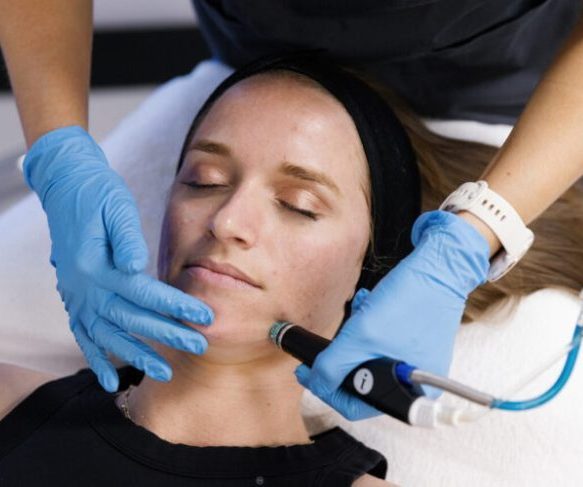
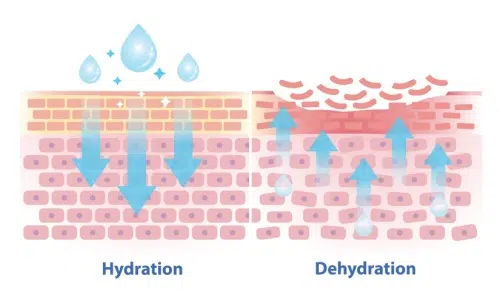
When skin becomes dehydrated, its outer layer loses water, weakening the skin barrier and causing cells to shrink, leading to roughness, dullness, and fine lines.
What Causes Dehydrated Skin?
Common contributing factors that lead to dehydrated skin, include:
- Hot showers strip natural oils from the skin causing it to become dehydrated.
- Harsh skincare products can disrupt the skin barrier and cause dehydration.
- Not drinking enough water lowers internal hydration levels.
- Cold or dry weather reduces moisture in the air and can cause dehydrated skin.
- Air conditioning or heating also dries out the surrounding air.
Signs You May Have Dehydrated Skin
- Tight or uncomfortable feeling, especially after cleansing
- Dull, lacklustre complexion
- Visible fine lines and temporary wrinkles
- Flakiness or rough texture
- Sensitivity or redness
If you notice these signs, a professional assessment can help determine the best treatment approach.
Understanding biological mechanisms of dehydrated skin helps guide professional treatments and daily skincare choices to restore hydration, strengthen the skin barrier, and maintain healthy, resilient skin.
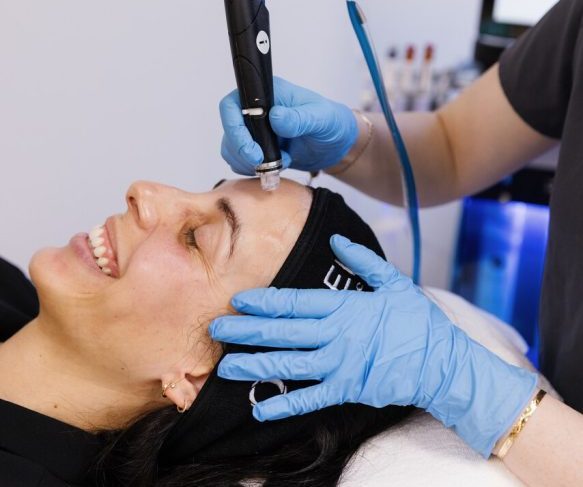
Book a Consultation and See How We Can Help You with Managing Dehydrated Skin

How we treat dehydrated Skin
Dehydrated Skin Treatment Brisbane
At Queensland Skin and Laser, we take a comprehensive approach to treating dehydrated skin, combining in-clinic treatments, personalised skincare, and lifestyle guidance to restore hydration and maintain long-term skin health.
Hydrafacial Treatments – Hydrafacial delivers deep hydration while gently exfoliating and cleansing the skin. It helps remove dead cells, unclog pores, and infuse the skin with moisture-rich serums, leaving your complexion refreshed, plump, and radiant.
Chemical Peels – Professional chemical peels can support skin renewal by removing dull, dehydrated layers of skin, improving texture and promoting a smoother, more even appearance. Peels are tailored to your skin type to ensure safety and effectiveness.
Personalised Skincare Regimes – We create a skincare routine specifically for your skin’s needs, including hydrating cleansers, barrier-supporting moisturisers, and SPF protection. Consistent home care helps maintain moisture levels and prevent further dehydration.
Lifestyle Factors – Dehydrated skin can also be influenced by external and internal factors. Our clinicians provide guidance on daily habits that support healthy, well-hydrated skin.
Why dehydrated skin matters
Dehydrated Skin Brisbane
Maintaining well-hydrated skin is a crucial foundation for achieving optimal results from laser therapies and other professional treatments. Hydrated skin is more resilient, elastic, and responsive, which can enhance treatment effectiveness and recovery.
- Improved Treatment Outcomes – Water acts as a chromophore in laser treatments, meaning it absorbs specific wavelengths of laser energy. Well-hydrated skin contains more water in its cells and tissues, which helps the laser work more effectively and safely. Dehydrated skin may reduce the efficiency of some laser procedures and increase the likelihood of irritation or uneven results. Maintaining good hydration prepares your skin to respond optimally to laser therapies.
- Enhanced Healing and Recovery – Hydrated skin supports the skin barrier and repair mechanisms, helping laser treatments and resurfacing procedures heal faster with reduced redness, sensitivity, and downtime.
- Optimised Collagen Production – Adequate hydration enhances the skin’s ability to produce collagen and elastin, amplifying the long-term benefits of microneedling, laser treatments, and other rejuvenation therapies.
- Better Tolerance of Treatments – Skin that is nourished and hydrated is less prone to irritation or adverse reactions, ensuring treatments are safer and more comfortable.
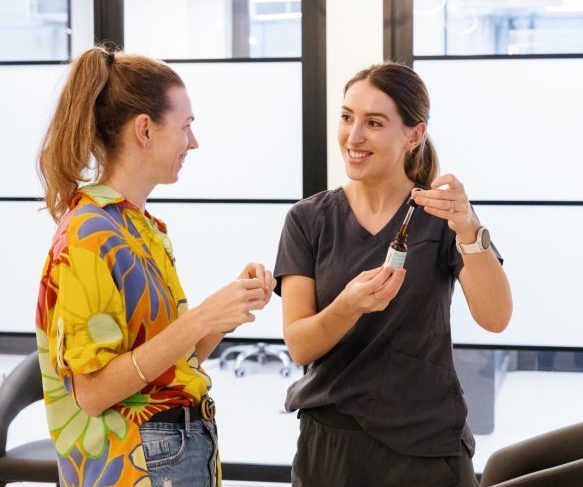
Preventing Dehydrated Skin
Maintaining healthy skin hydration involves protecting the skin barrier and reducing moisture loss. Key prevention strategies include:
- Use a gentle cleanser – Avoid products that strip natural oils.
- Apply moisturiser regularly – Choose one with humectants and barrier-repair ingredients.
- Limit hot showers – Use lukewarm water to reduce water loss.
- Stay hydrated – Drink adequate water throughout the day.
- Avoid harsh weather exposure – Use sunscreen and barrier creams in extreme conditions.
Why Choose
Queensland Skin & Laser?
At Queensland Skin & Laser in Brisbane, we specialise in addressing dehydrated skin. Our medical cosmetic team offers personalised treatments designed to restore hydration, and enhance skin tone and texture.
Expert-Led
Care
Led by Dr. Mark Chernoff, a seasoned physician with expertise in skin cancer detection, general and cosmetic dermatology, and advanced laser therapies, the clinic ensures high standards of care across all treatments.
Advanced
Technology
Queensland Skin and Laser integrates state-of-the-art laser systems, HIFU, RF needling, and photodynamic therapy, offering the latest in skin rejuvenation, tightening, and sun damage treatment.
Patient-Centred,
Boutique Experience
Patients experience a personalised, boutique environment where their concerns are met with unmatched professionalism and dedicated care.
Complimentary Cosmetic
Consultations
Clients receive a free consultation with the clinic’s cosmetic nurses, making expert skin advice accessible without upfront costs.
Flexible Payment
Plans
Offering weekly payment options through Zip Pay, the clinic ensures financial flexibility for both cosmetic and medical treatments.
Trusted Reputation
and Certifications
As a Fellow of the RACGP, an accreditation assessor, and an experienced dermatology professional, Dr. Chernoff and his team are recognised for their commitment to high standards, safety, and patient well-being.
Meet Dr Mark Chernoff
BSC (EXHP), MBBS (MELB), FRACGP, MFIN, CFTP
Dr Mark Chernoff earned a Bachelor of Science in Exercise and Health Physiology, followed by a Bachelor of Medicine and Bachelor of Surgery from the University of Melbourne in 2010. He began his postgraduate career at St. Vincent’s Hospital in Melbourne, specialising in general and plastic surgery.
Dr Chernoff serves as a Visiting Medical Officer in Emergency Medicine and works as a GP Surgeon in rural NSW. With extensive experience in skin cancer surgery, medical laser treatments and cosmetic medicine, he also contributes to medical education by supervising registrars for the Australian College of Rural and Remote Medicine and the Royal Australian College of General Practitioners.
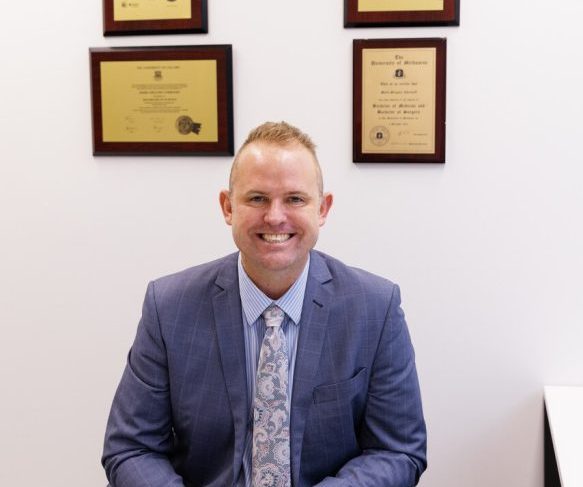
Where to Find
Queensland skin and Laser
How to schedule
a consultation
To book an appointment, click the button above, call 07 3544 6425, or email admin@qldskinandlaser.com.
Find us here:
- Level 2 – 445 Upper Edward St
Spring Hill QLD 4000
Frequently Asked Questions
About Dehydrated Skin
What is dehydrated skin, and how does it differ from dry skin?
Dehydrated skin doesn’t have enough water, while dry skin doesn’t produce enough oil. Dehydration is a temporary condition that can affect any skin type—even oily skin. Dry skin is a long-term skin type that often feels rough or flaky. Have your skin assessed at Queensland Skin and Laser during a complimentary consultation with our dermal nurses.
How can I tell if my skin is dehydrated?
Your skin may feel tight, look dull, or show fine lines more easily. It might also feel rough or sensitive. A simple way to check is by gently pinching your cheek—if the skin doesn’t bounce back quickly, it may be dehydrated.
What causes skin to become dehydrated?
Many things can lead to dehydration, including cold or dry air, hot showers, air conditioning, not drinking enough water, or using harsh skincare products. These factors can weaken your skin barrier and increase water loss. Visit Queensland Skin and Laser for treatments to restore hydration and improve your skin’s overall health.
How do you treat or fix dehydrated skin?
Improve skin hydration by choosing gentle skincare products, applying moisturisers that lock in water, and avoiding products that strip the skin’s natural barrier. Drink enough water throughout the day and protect your skin from harsh environments such as wind, cold, or excessive sun exposure.
You can also support hydration with professional treatments, such as hydrafacial, skin boosters, and LED light therapy to promote skin repair. A mild chemical or enzyme peels may be recommended to gently exfoliate the skin and enhance the absorption of hydrating products.
Does drinking more water help hydrate the skin?
Drinking water supports your overall health, but it doesn’t always fix dehydrated skin on its own. Your skin also needs topical hydration—products that help it hold onto water and strengthen its protective barrier. Speak to our experienced dermal therapist during a complimentary consultation on how to best manage your dehydrated skin.
Any surgical or invasive procedure carries risks. Before proceeding, you should seek a second opinion from an appropriately qualified health practitioner.

Got a question regarding dehydrated skin? Complete the form below and we will get back to you shortly.
